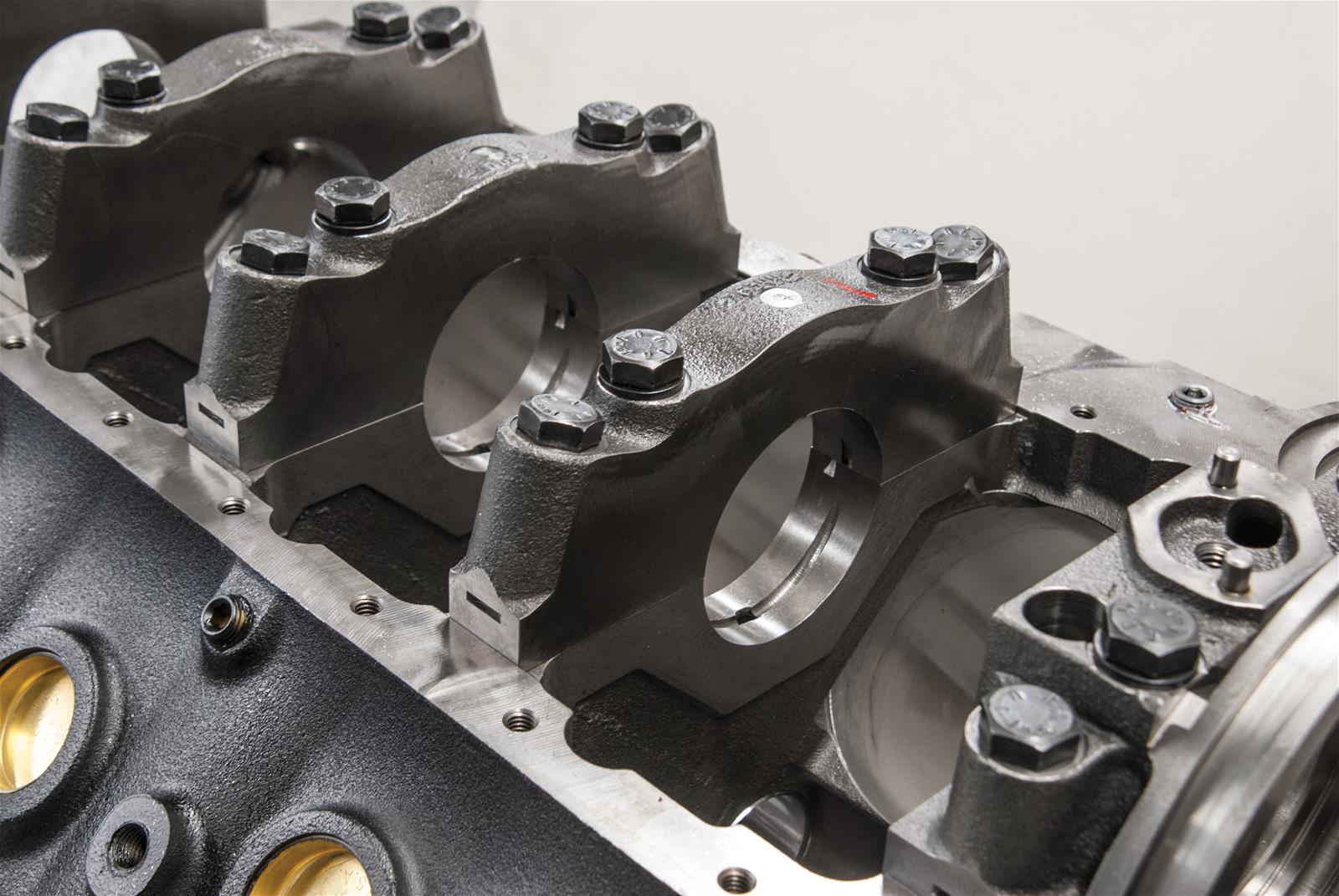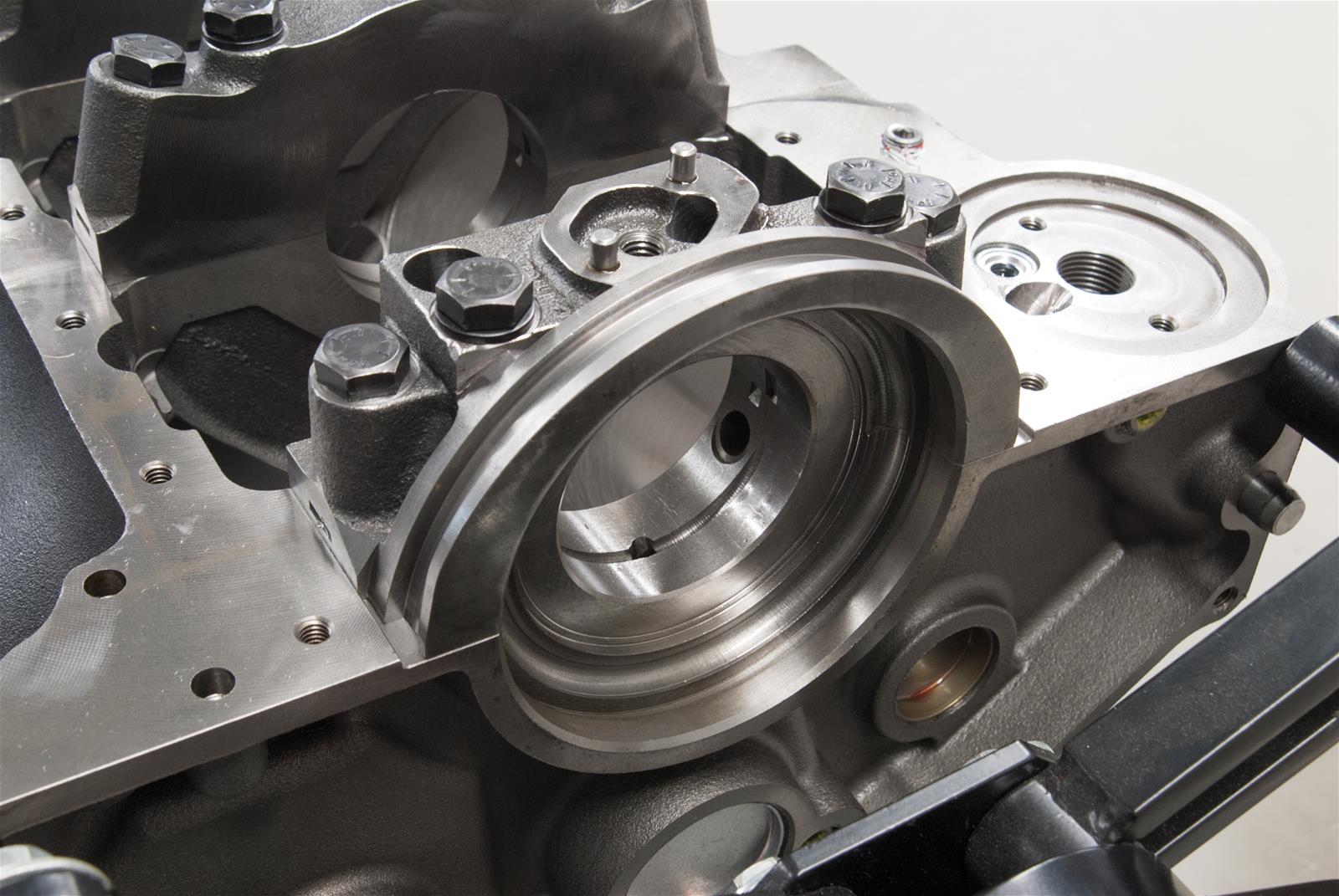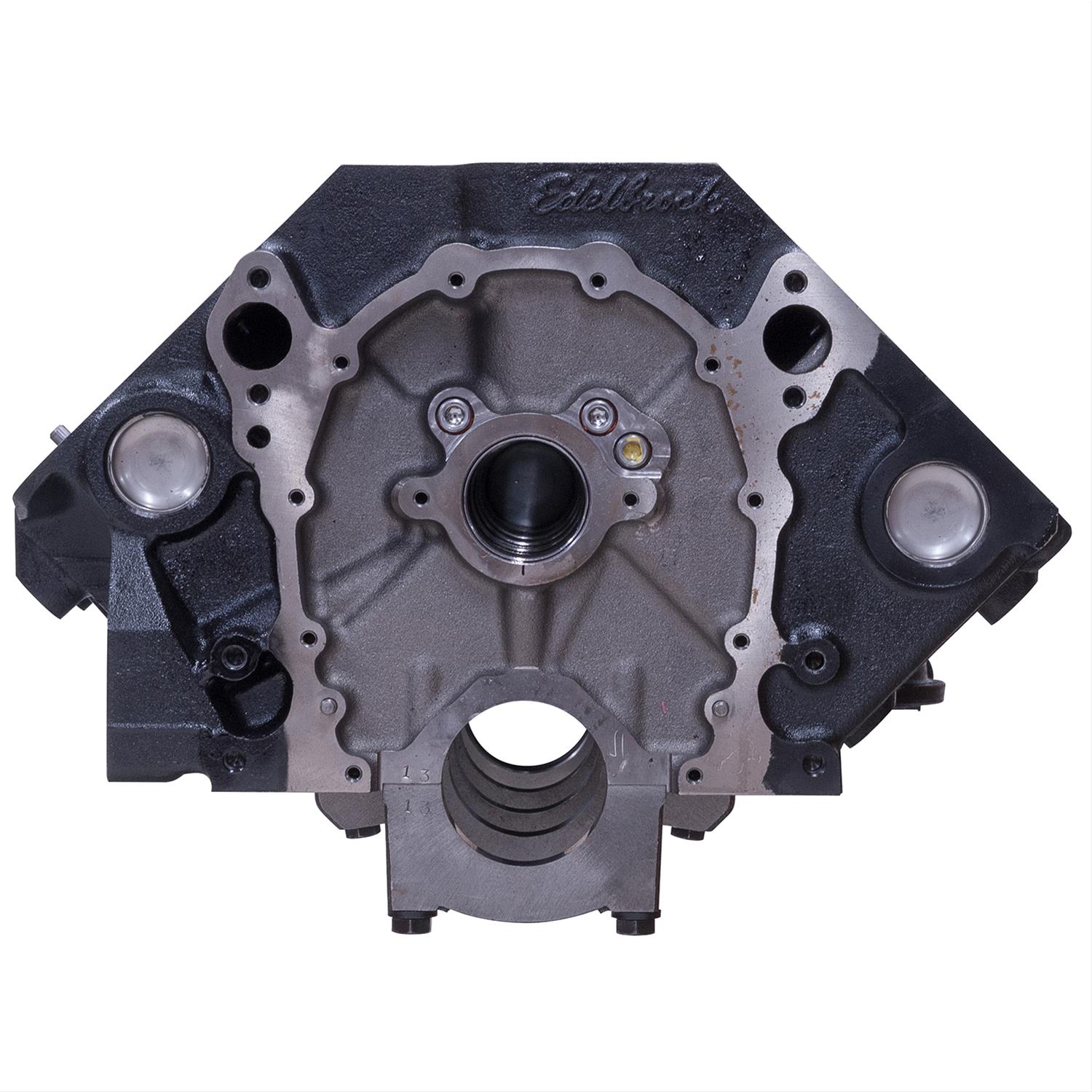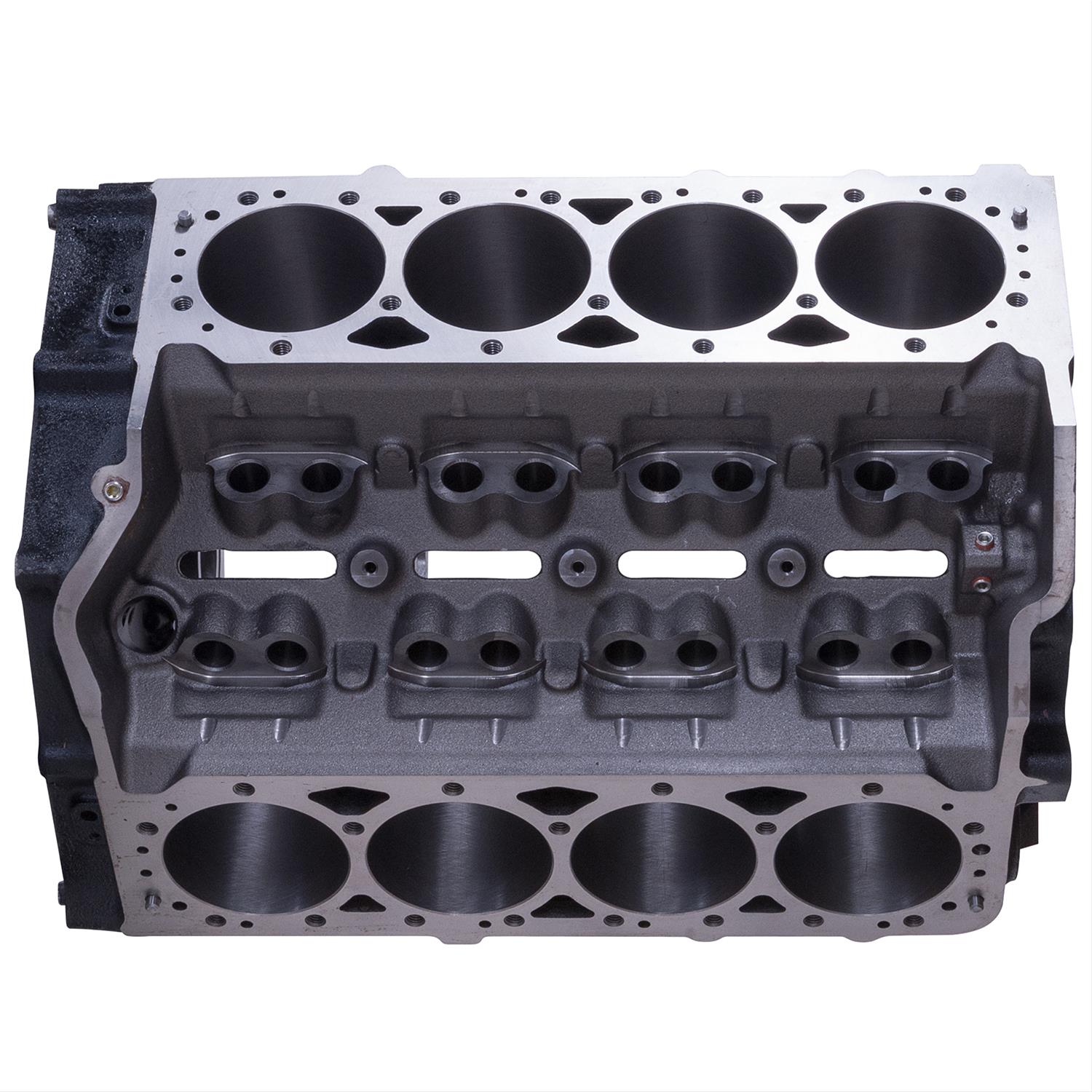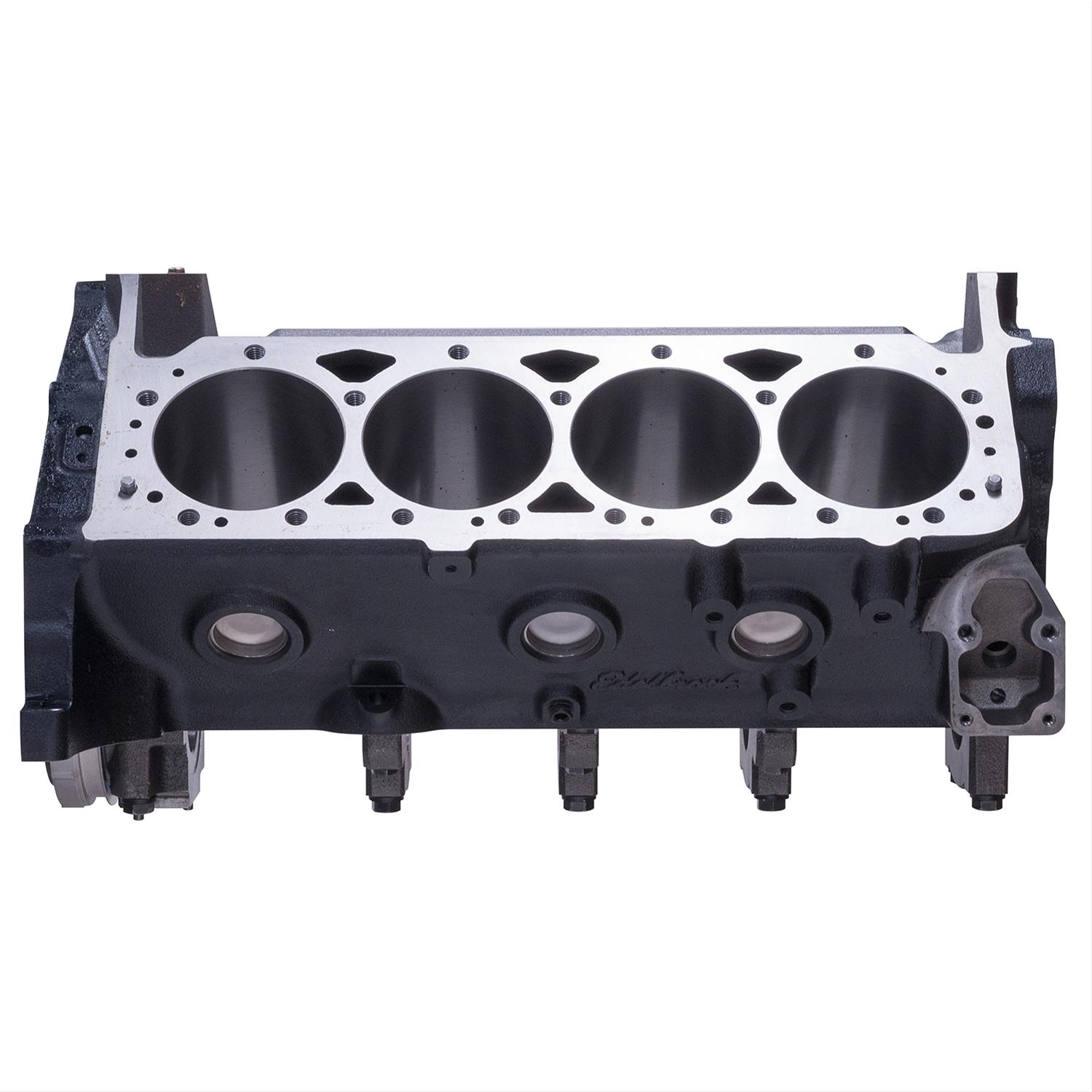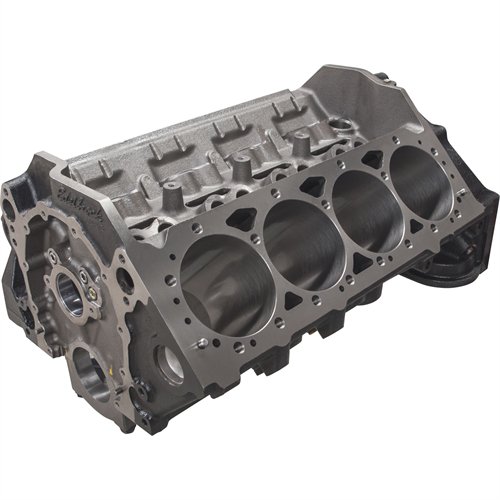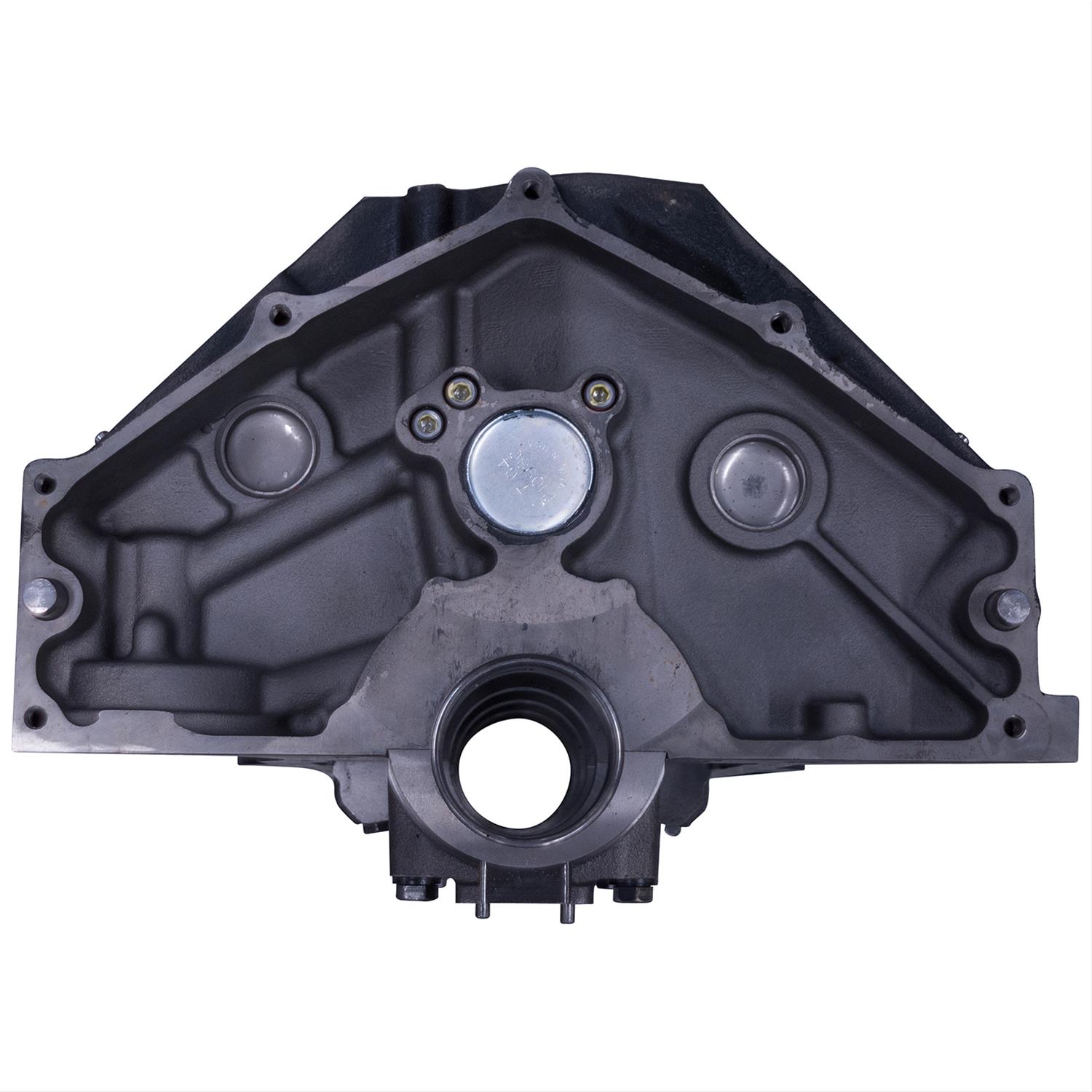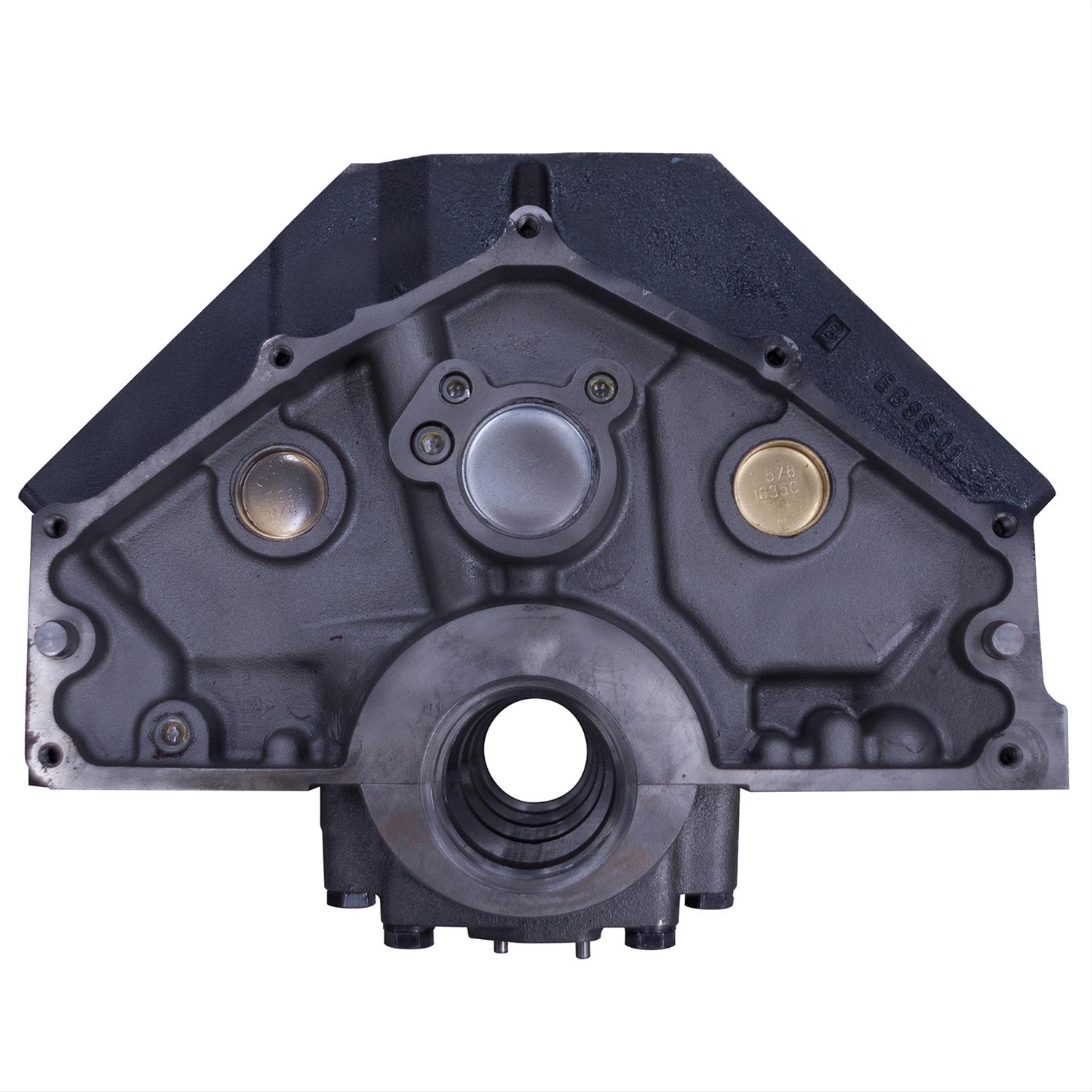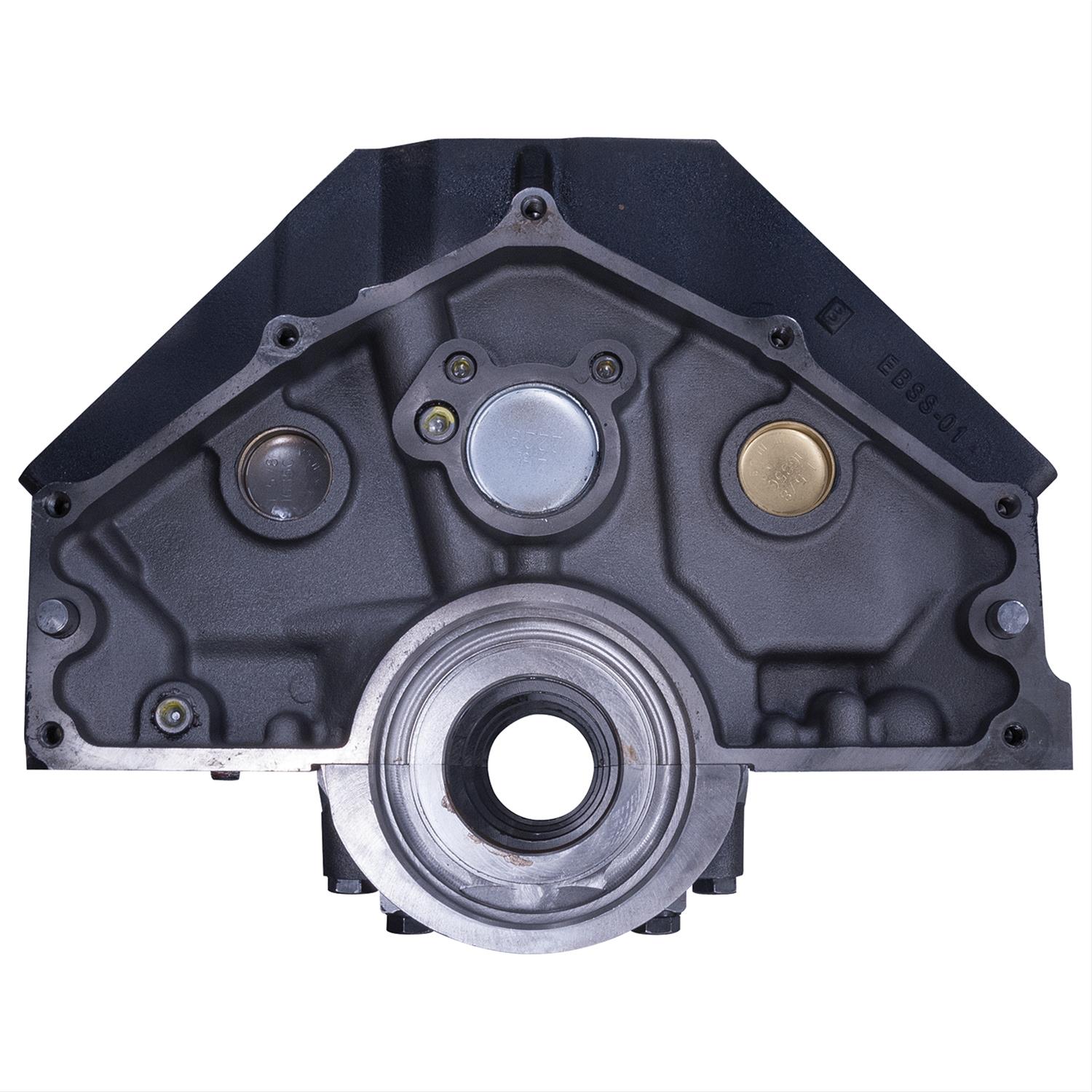https://www.enginelabs.com/engine-tech/engine-blocks/edelbrock-engine-block-castings/
Edelbrock Introduces Chevrolet Small- And Big-Block Engine Castings

By CHRISTOPHER HOLLEY DECEMBER 19, 2018
The time has come to rebuild your tired small- or big-block Chevy engine, and you have some concerns about reusing your decades-old engine block. Your concerns deepen if the block has previously been machined, limiting your options even more. Worse yet, maybe your engine suffered a catastrophic high-speed disassembly, that resulted in a damaged block. Regardless of the concern, what are your choices?
You could search the online auctions or visit junkyards to find an acceptable factory block, which leaves you in the similar situation of using an older used block. With a salvage-yard block, you have the added concern of a limited familiarity of the block’s history and what problems lie within. On the other end of the spectrum, you could purchase a race block, but most likely, that would be overkill (depending upon your expected usage), and the hit to your wallet would be significant. To fill the gap between the old factory-block castings and the high-dollar race-block castings, Edelbrock has begun offering its version of the popular Chevrolet small block (based on the 350- or 400-cubic inch displacement) and big-block engines.
Edelbrock has recently introduced two small-block castings and two big-block castings to its ever-expanding product line. The castings are based upon the popular Chevrolet small-block (350 or 400ci) and big-block engines. The main journals are a splayed four-bolt design, and the rear-main seal is either a one- or two-piece design depending upon the block selected.
The New Castings
Why is Edelbrock throwing its hat into the aftermarket engine-block arena? According to Edelbrock’s Eric Blakely, “We have been looking into providing our own blocks for a while. For years, our customers have asked us for new blocks. We build a lot of engines at Edelbrock, and our desire is to maintain quality control and add to our product offerings with first-class engine blocks made in the USA.”
Recently, the all-new Edelbrock small- and big-block castings have been released to the public, and each block is cast and meticulously machined to Edelbrock’s standards. Even though the block castings are a new product, a select few of the small-block castings were used with Edelbrock’s crate engine program prior to the public release.
These small- and big-block castings are intended to be used in uncontrolled vehicles receiving an engine swap, or pre-emission-controlled vehicle. They are not legal for use in emission-controlled vehicles. Uncontrolled vehicles are defined as (1) 1965 and older U.S.-manufactured California Certified vehicles, (2) 1967 and older U.S.-manufactured Federally Certified vehicles, or (3) 1967 and older Foreign manufactured vehicles. Each block is shipped ready for final machining and assembly. However, it is the responsibility of the machinist and the engine builder to finish the block to the desired preferences.
Two New Small Blocks
Edelbrock’s two small-block castings can provide a foundation for a 700-plus horsepower engine. The 350ci block comes with a one-piece rear main-seal, while the 400ci block utilizes a two-piece rear main seal. Both block castings are produced with high-quality iron and Nodular iron, four-bolt splayed main caps (the front and rear main caps are two-bolt).
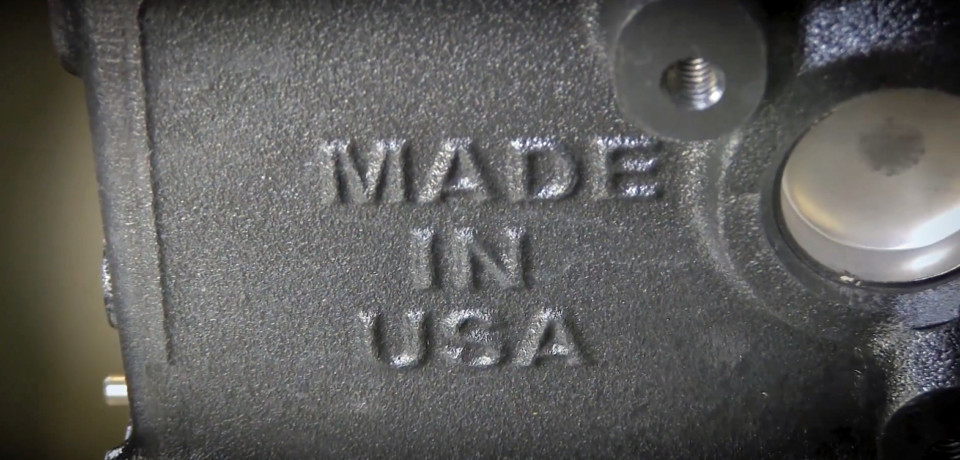
All Edelbrock engine blocks are cast in the U.S.A.
On both blocks, the center-main bolt holes are tapped for a 7/16-14 thread. All outer-main bolt holes are tapped for a 3/8-16 thread. The blocks have 9.025-inch deck heights, and the bore spacing is 4.40 inches. The Edelbrock block castings include a factory head-bolt pattern, camshaft location and bore size, lifter-bore spacing and location, spec-tapped bolt holes, main bore size, and will work with 8- or 10-bolt timing chain covers.
The 7/16-14 cylinder-head bolt holes allow the factory head to be secured to the deck. The head-bolt holes extend into the water jackets. The blocks are machined for either an early-style with no-cam retainer, or the late-style with a cam retainer. The blocks also have hydraulic-roller provisions.
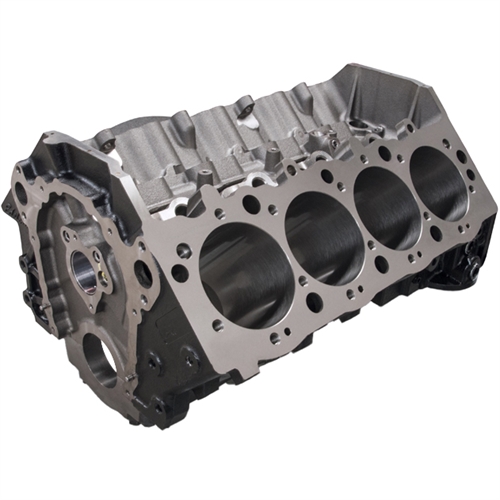
Each block has an oil-filter mounting boss designed for a thread-on oil-filter adapter (included) and has a built-in oil bypass. The blocks have a fuel-pump boss provision for a mechanical fuel pump, and each block is drilled and tapped for side and front engine mounts in the factory locations. The starter mounting pad is drilled for multiple mounting patterns, and the blocks are machined with a clutch linkage boss. Lastly, the dipstick is located on the passenger side only.
The 350ci Version
The two small blocks are very similar to each other, but there are a few important differences between the two. As previously mentioned, the 350 block (part no. 450021, suggested retail price: $2,174.55) utilizes a one-piece rear-main seal. It comes with a 4.00-inch bore, and the block has clearance for a 3.75-inch stroke. With the 3.75-inch stroke and a .060-inch overbore, the 350 blocks will provide a maximum of 388 cubes, while retaining a major thrust-side, cylinder-wall thickness of 0.230-inches. The block is a wet design with cast-iron cylinder walls. The main bore sizing is the factory size of 2.6406-inches.
The 350 block (part no. 450021) carries a one-piece rear-main seal.
The 400ci Version
The 400 block (part no. 450020, suggested retail price: $2,174.55) utilizes a two-piece rear-main seal. The 400 block has a 4.125-inch bore with Siamese cylinders, and just like the 350, it can swallow a 3.75-inch-stroke rotating assembly. The 400 block can provide up to a massive 440 cubes while maintaining a 0.260-inch major thrust-side, cylinder-wall thickness. The main bore sizing is the factory size of 2.8406-inches.
The 400 block (part no. 450020) uses a two-piece rear-main seal. The Siamese cylinder 400 block has a 4.125-inch bore, and has been machined to accept a 3.75-inch-stroke crankshaft.
One Big Block with Two Different Rear-Main Seal Offerings
The Edelbrock big-block castings can be ordered with either a one-piece rear-main seal (part no. 450001, suggested retail price: $2,651.85) or a two-piece rear-main seal (part no. 450000, suggested retail price: $2,651.85). Each block is capable of handling of 1,000-plus horsepower. Regardless of which rear-main seal is selected, the big-block castings come with a 9.800-inch deck height (actual deck height is .005-.010-inch taller for additional machining requirements) and Siamese cylinders with a 4.500-inch bore that can be machined to 4.600-inches overbore.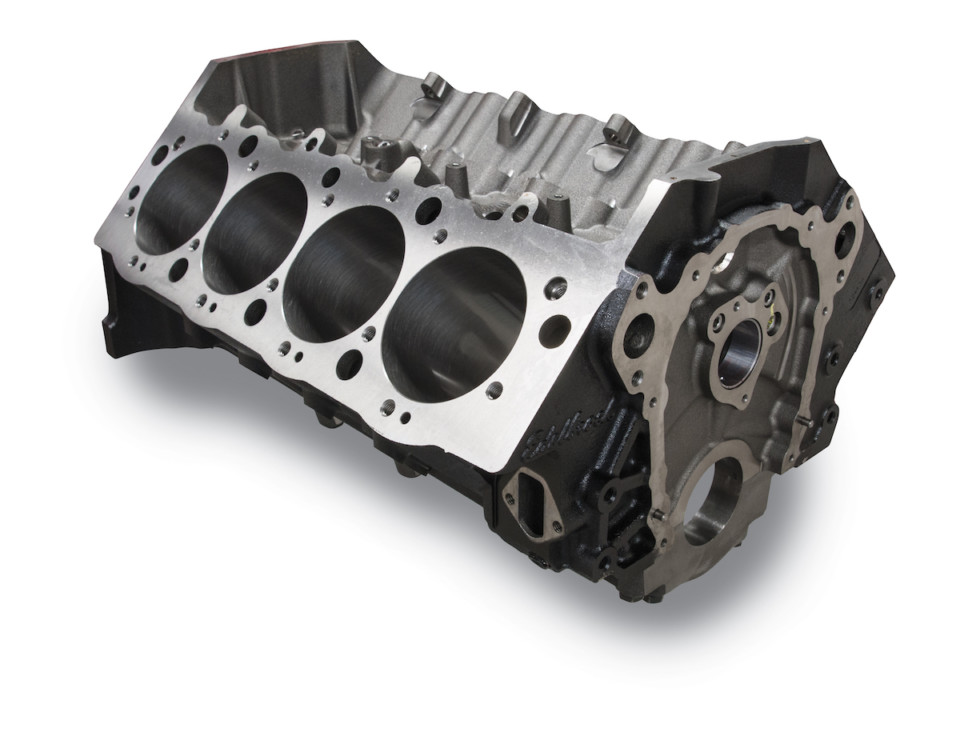
Each block can accommodate a 4.500-inch stroke, which combined with the 4.600-inch cylinder overbore will result in an engine displacement closing in on 600 cubic inches. With the wide variety of rotating-assembly components available, always check the clearance of all the moving parts, especially the crankshaft counterweights and the connecting rods, which require a minimum of .060-inch clearance.
The Edelbrock big-blocks have a cylinder-bore spacing of 4.840-inches, and the deck’s head-stud holes do not protrude into the water jackets. The lifter-bore clearances are on the tight end of the factory specifications, and the bores might require a light hone to open them up in some cases to allow the proper fit of aftermarket tappets. The bores will accept Gen V and VI lifters, and most link bars without modification.
The camshaft bore is the factory 2.120-inch size, and the main-bearing bore with the Nodular four-bolt iron main caps is 2.9370-inches, which is the factory size. A 10-bolt timing cover will fit the two-piece rear-main seal block, and a 6-bolt timing cover will fit the one-piece rear-main seal block. Each block is cast with a fuel pump boss, a factory starter bolt pattern and location, and the engine mounts are cast in the factory locations.
The Edelbrock big-block castings can be ordered with a two-piece rear-main seal (part no. 450000 (far left) or a one-piece rear-main seal (part no. 450001 (far right)). The big-block castings are capable of withstanding in excess of 1,000 horsepower.
Conclusions
Whether in a daily driver or high-performance machine, Edelbrock’s small- and big-block castings offer enthusiasts the opportunity to have a high-quality block that is a great starting point for their engine build. Each block casting is an improvement over a factory-block casting, yet more affordable than a costly aftermarket race block.
Edelbrock designed the small- and big-block castings to operate with the factory stock components, which helps keep the engine-rebuild expenses reasonable. If more power is required, most aftermarket components will work with the Edelbrock castings, including its well-researched and popular top-end kits (includes heads, intake manifold, camshaft, lifters, timing chain, etc.).
With all the benefits of new block castings from Edelbrock, why would you ever contemplate reusing an old block? When the time comes for a rebuild of your small- or big-block Chevrolet engine, consider a freshly cast, built-in-the-USA, Edelbrockengine block as the foundation of reliable performance for your street or strip General Motors vehicle.
Edelbrock Introduces Chevrolet Small- And Big-Block Engine Castings

By CHRISTOPHER HOLLEY DECEMBER 19, 2018
The time has come to rebuild your tired small- or big-block Chevy engine, and you have some concerns about reusing your decades-old engine block. Your concerns deepen if the block has previously been machined, limiting your options even more. Worse yet, maybe your engine suffered a catastrophic high-speed disassembly, that resulted in a damaged block. Regardless of the concern, what are your choices?
You could search the online auctions or visit junkyards to find an acceptable factory block, which leaves you in the similar situation of using an older used block. With a salvage-yard block, you have the added concern of a limited familiarity of the block’s history and what problems lie within. On the other end of the spectrum, you could purchase a race block, but most likely, that would be overkill (depending upon your expected usage), and the hit to your wallet would be significant. To fill the gap between the old factory-block castings and the high-dollar race-block castings, Edelbrock has begun offering its version of the popular Chevrolet small block (based on the 350- or 400-cubic inch displacement) and big-block engines.
Edelbrock has recently introduced two small-block castings and two big-block castings to its ever-expanding product line. The castings are based upon the popular Chevrolet small-block (350 or 400ci) and big-block engines. The main journals are a splayed four-bolt design, and the rear-main seal is either a one- or two-piece design depending upon the block selected.
The New Castings
Why is Edelbrock throwing its hat into the aftermarket engine-block arena? According to Edelbrock’s Eric Blakely, “We have been looking into providing our own blocks for a while. For years, our customers have asked us for new blocks. We build a lot of engines at Edelbrock, and our desire is to maintain quality control and add to our product offerings with first-class engine blocks made in the USA.”
Recently, the all-new Edelbrock small- and big-block castings have been released to the public, and each block is cast and meticulously machined to Edelbrock’s standards. Even though the block castings are a new product, a select few of the small-block castings were used with Edelbrock’s crate engine program prior to the public release.
These small- and big-block castings are intended to be used in uncontrolled vehicles receiving an engine swap, or pre-emission-controlled vehicle. They are not legal for use in emission-controlled vehicles. Uncontrolled vehicles are defined as (1) 1965 and older U.S.-manufactured California Certified vehicles, (2) 1967 and older U.S.-manufactured Federally Certified vehicles, or (3) 1967 and older Foreign manufactured vehicles. Each block is shipped ready for final machining and assembly. However, it is the responsibility of the machinist and the engine builder to finish the block to the desired preferences.
Two New Small Blocks
Edelbrock’s two small-block castings can provide a foundation for a 700-plus horsepower engine. The 350ci block comes with a one-piece rear main-seal, while the 400ci block utilizes a two-piece rear main seal. Both block castings are produced with high-quality iron and Nodular iron, four-bolt splayed main caps (the front and rear main caps are two-bolt).

All Edelbrock engine blocks are cast in the U.S.A.
On both blocks, the center-main bolt holes are tapped for a 7/16-14 thread. All outer-main bolt holes are tapped for a 3/8-16 thread. The blocks have 9.025-inch deck heights, and the bore spacing is 4.40 inches. The Edelbrock block castings include a factory head-bolt pattern, camshaft location and bore size, lifter-bore spacing and location, spec-tapped bolt holes, main bore size, and will work with 8- or 10-bolt timing chain covers.
The 7/16-14 cylinder-head bolt holes allow the factory head to be secured to the deck. The head-bolt holes extend into the water jackets. The blocks are machined for either an early-style with no-cam retainer, or the late-style with a cam retainer. The blocks also have hydraulic-roller provisions.

Each block has an oil-filter mounting boss designed for a thread-on oil-filter adapter (included) and has a built-in oil bypass. The blocks have a fuel-pump boss provision for a mechanical fuel pump, and each block is drilled and tapped for side and front engine mounts in the factory locations. The starter mounting pad is drilled for multiple mounting patterns, and the blocks are machined with a clutch linkage boss. Lastly, the dipstick is located on the passenger side only.
The 350ci Version
The two small blocks are very similar to each other, but there are a few important differences between the two. As previously mentioned, the 350 block (part no. 450021, suggested retail price: $2,174.55) utilizes a one-piece rear-main seal. It comes with a 4.00-inch bore, and the block has clearance for a 3.75-inch stroke. With the 3.75-inch stroke and a .060-inch overbore, the 350 blocks will provide a maximum of 388 cubes, while retaining a major thrust-side, cylinder-wall thickness of 0.230-inches. The block is a wet design with cast-iron cylinder walls. The main bore sizing is the factory size of 2.6406-inches.
The 350 block (part no. 450021) carries a one-piece rear-main seal.
The 400ci Version
The 400 block (part no. 450020, suggested retail price: $2,174.55) utilizes a two-piece rear-main seal. The 400 block has a 4.125-inch bore with Siamese cylinders, and just like the 350, it can swallow a 3.75-inch-stroke rotating assembly. The 400 block can provide up to a massive 440 cubes while maintaining a 0.260-inch major thrust-side, cylinder-wall thickness. The main bore sizing is the factory size of 2.8406-inches.
The 400 block (part no. 450020) uses a two-piece rear-main seal. The Siamese cylinder 400 block has a 4.125-inch bore, and has been machined to accept a 3.75-inch-stroke crankshaft.
One Big Block with Two Different Rear-Main Seal Offerings
The Edelbrock big-block castings can be ordered with either a one-piece rear-main seal (part no. 450001, suggested retail price: $2,651.85) or a two-piece rear-main seal (part no. 450000, suggested retail price: $2,651.85). Each block is capable of handling of 1,000-plus horsepower. Regardless of which rear-main seal is selected, the big-block castings come with a 9.800-inch deck height (actual deck height is .005-.010-inch taller for additional machining requirements) and Siamese cylinders with a 4.500-inch bore that can be machined to 4.600-inches overbore.

Each block can accommodate a 4.500-inch stroke, which combined with the 4.600-inch cylinder overbore will result in an engine displacement closing in on 600 cubic inches. With the wide variety of rotating-assembly components available, always check the clearance of all the moving parts, especially the crankshaft counterweights and the connecting rods, which require a minimum of .060-inch clearance.
The Edelbrock big-blocks have a cylinder-bore spacing of 4.840-inches, and the deck’s head-stud holes do not protrude into the water jackets. The lifter-bore clearances are on the tight end of the factory specifications, and the bores might require a light hone to open them up in some cases to allow the proper fit of aftermarket tappets. The bores will accept Gen V and VI lifters, and most link bars without modification.
The camshaft bore is the factory 2.120-inch size, and the main-bearing bore with the Nodular four-bolt iron main caps is 2.9370-inches, which is the factory size. A 10-bolt timing cover will fit the two-piece rear-main seal block, and a 6-bolt timing cover will fit the one-piece rear-main seal block. Each block is cast with a fuel pump boss, a factory starter bolt pattern and location, and the engine mounts are cast in the factory locations.
The Edelbrock big-block castings can be ordered with a two-piece rear-main seal (part no. 450000 (far left) or a one-piece rear-main seal (part no. 450001 (far right)). The big-block castings are capable of withstanding in excess of 1,000 horsepower.
Conclusions
Whether in a daily driver or high-performance machine, Edelbrock’s small- and big-block castings offer enthusiasts the opportunity to have a high-quality block that is a great starting point for their engine build. Each block casting is an improvement over a factory-block casting, yet more affordable than a costly aftermarket race block.
Edelbrock designed the small- and big-block castings to operate with the factory stock components, which helps keep the engine-rebuild expenses reasonable. If more power is required, most aftermarket components will work with the Edelbrock castings, including its well-researched and popular top-end kits (includes heads, intake manifold, camshaft, lifters, timing chain, etc.).
With all the benefits of new block castings from Edelbrock, why would you ever contemplate reusing an old block? When the time comes for a rebuild of your small- or big-block Chevrolet engine, consider a freshly cast, built-in-the-USA, Edelbrockengine block as the foundation of reliable performance for your street or strip General Motors vehicle.

